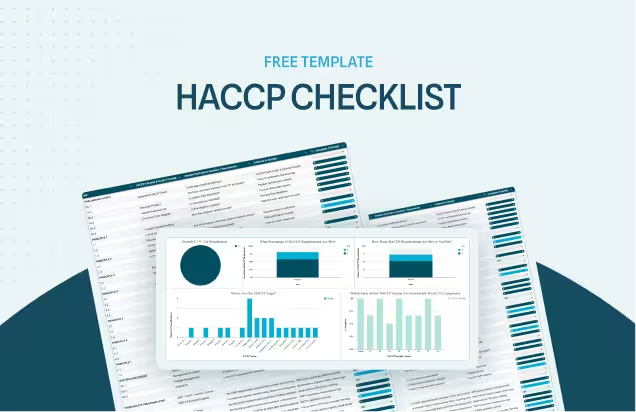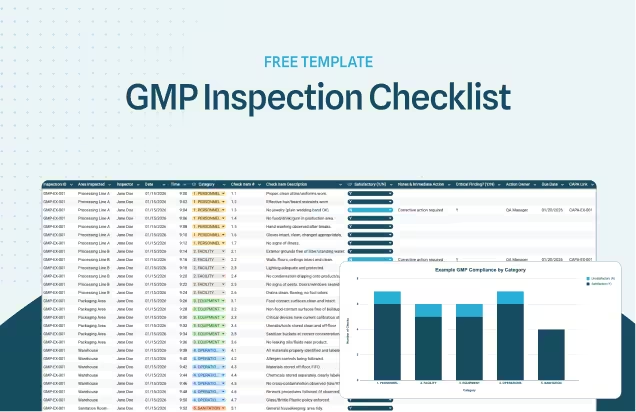

Best 7 HACCP Compliance Software for 2026

Best 7 HACCP Software for 2026
#1 Allera Technologies: Best for food manufacturers that need a compliant, intuitive, and powerful HACCP system accessible to teams of all tech levels. Allera combines easy-to-use digital forms, automated document control, and supplier management into one connected platform—helping companies stay audit-ready and confidently meet SQF, HACCP, BRCGS, and FDA requirements without the complexity.
#2 SafetyChain: Best for large-scale food manufacturers needing enterprise-grade plant management with real-time monitoring and advanced production analytics.
#3 FoodDocs: Best for small food businesses seeking quick implementation with automated HACCP plan generation and affordable pricing.
#4 Safefood 360°: Best for enterprise food manufacturers requiring comprehensive end-to-end food safety management across multiple facilities.
#5 FoodLogiQ: Best for food companies prioritizing supply chain traceability and supplier network management.
#6 SafetyCulture (iAuditor): Best for businesses wanting flexible, budget-friendly inspection management with extensive template libraries.
#7 TraceGains:
Best 7 HACCP Compliance Software
1. Allera Technologies
URL: https://www.alleratech.com/
Allera is an AI-powered HACCP compliance platform designed specifically for food manufacturers. It digitizes HACCP monitoring with customizable CCP forms, automates critical limit tracking with real-time alerts, and provides centralized document control for HACCP plans with version tracking and AI compliance reviews.
Best For: Small to mid-size food manufacturers and processors needing fast HACCP compliance implementation with minimal IT overhead
Pricing: Custom pricing (contact for quote)
Implementation Time: 30 days
Deployment Type/Access: Web, iOS, Android
Feature List:
- Customizable HACCP monitoring forms with user-friendly form builder
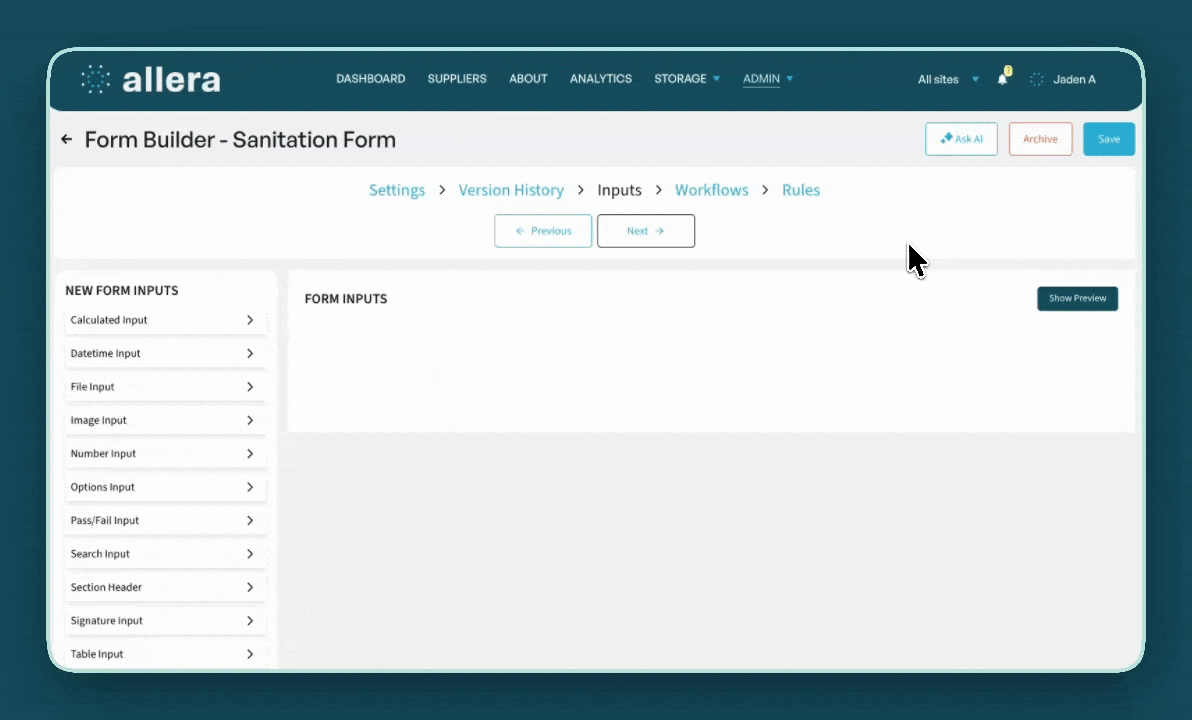
- Conditional logic that triggers corrective actions when critical limits are exceeded
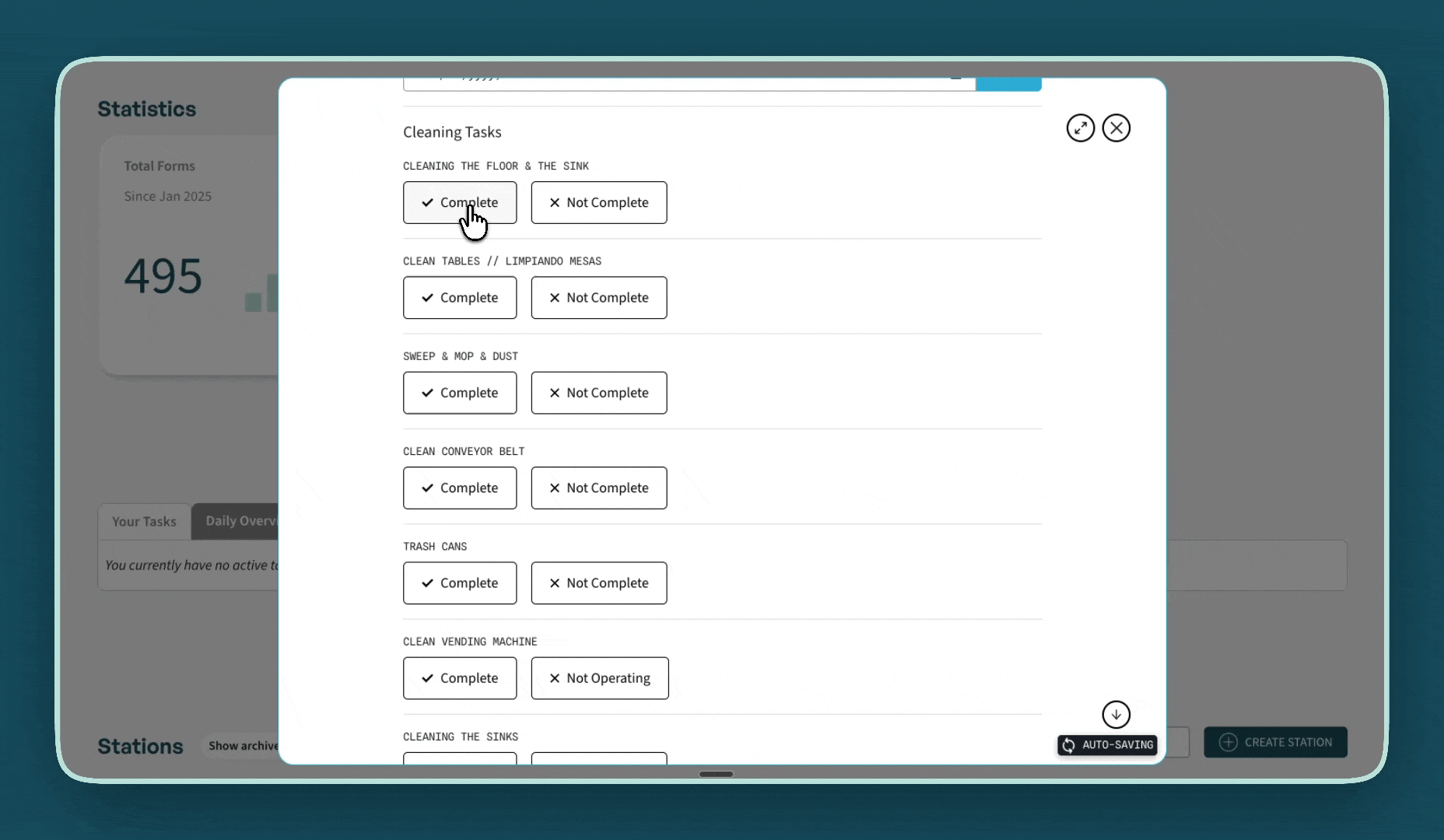
- Real-time CCP data capture with validation checks
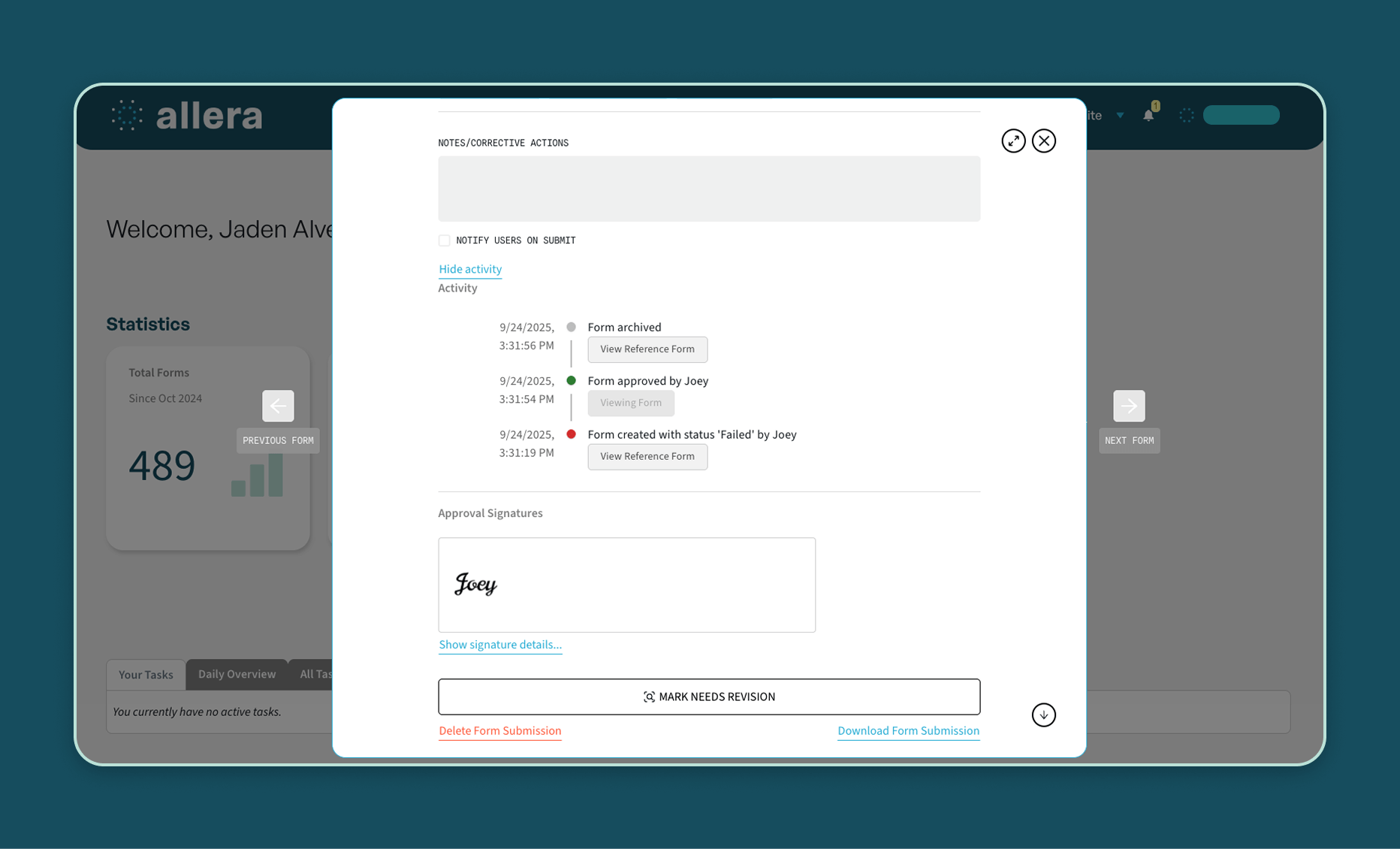
- Time and operator stamped entries for HACCP accountability
.png)
- Task management ensures timely completion of HACCP monitoring checks
- Audit readiness with unlimited storage and searchable HACCP records by lot code, date, CCP, and status
- Full traceability by lot code for HACCP compliance across operations
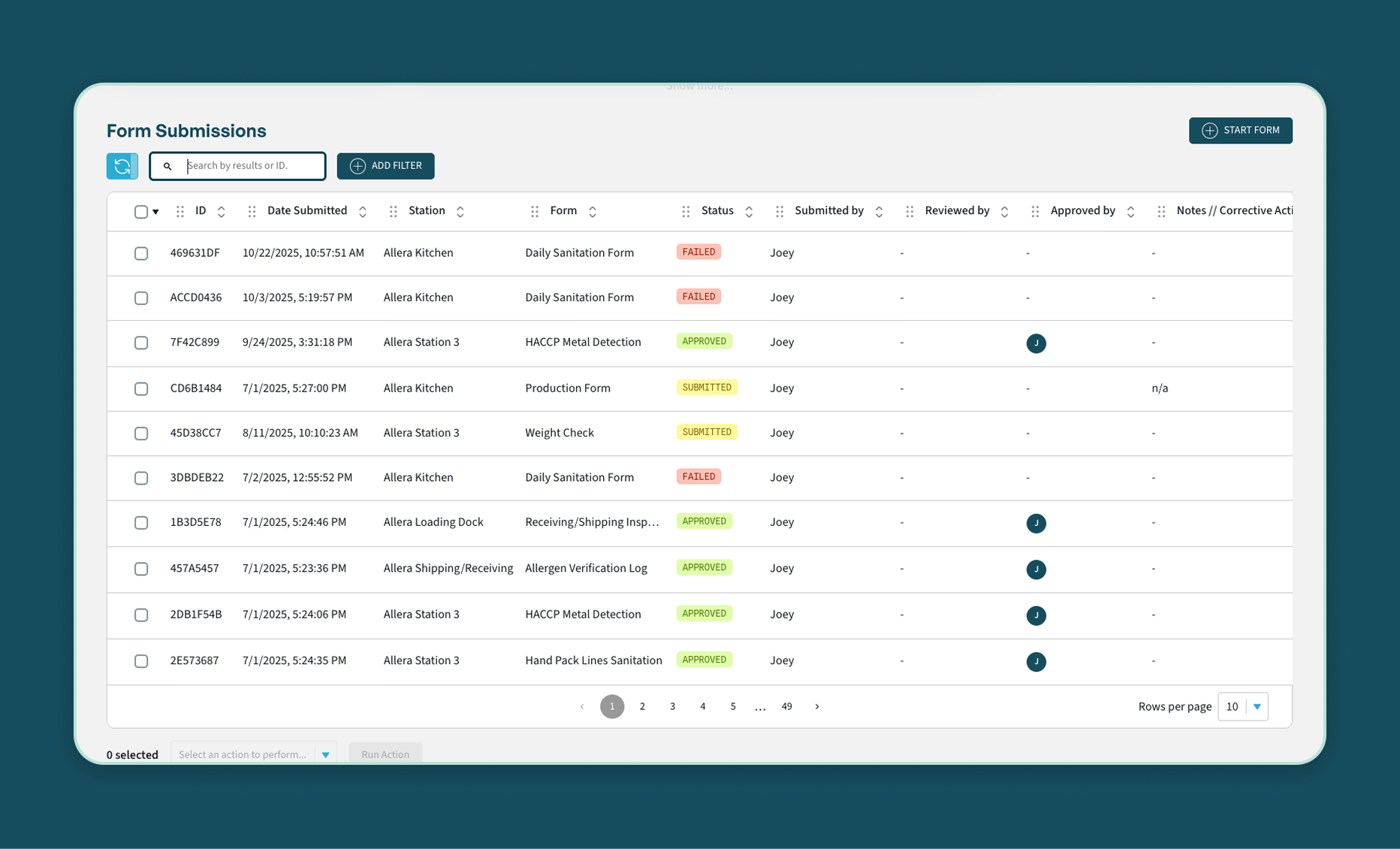
- Verification workflows for HACCP plan review and approval
.png)
- Analytics with customizable dashboards for tracking critical control points
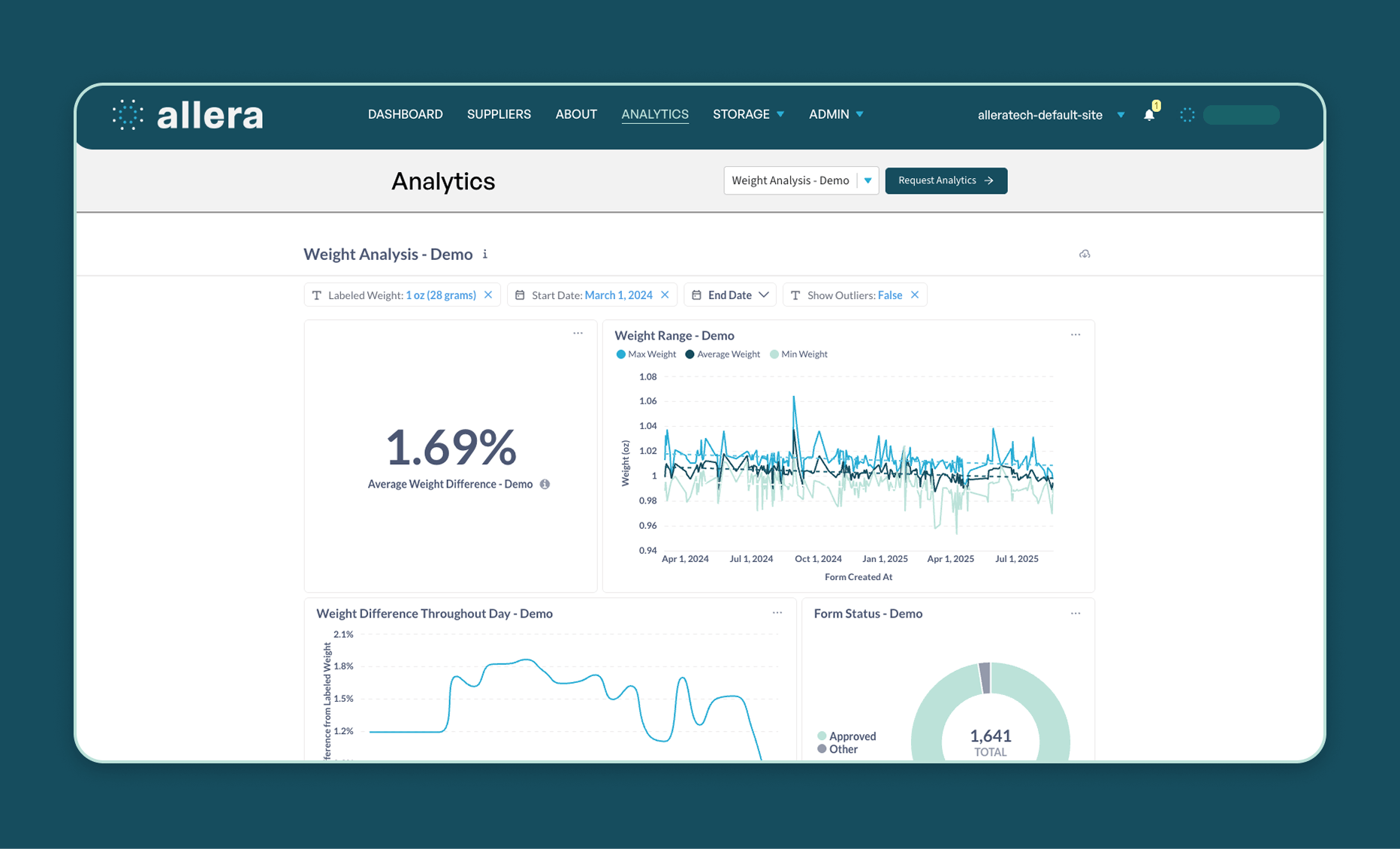
- User grouping for assigning HACCP monitoring responsibilities
- Dynamic supplier onboarding for collecting HACCP certifications
- Expiration tracking with automated notifications for supplier HACCP documents
- Centralized database for all HACCP-related documentation
- Supplier scorecarding for HACCP compliance tracking
- Version control with revision history for HACCP plans
- Access control for HACCP documentation
- Training management with HACCP plan acknowledgment tracking
.png)
- AI compliance reviews to assist HACCP plan/document alignment with compliance and regulatory standards
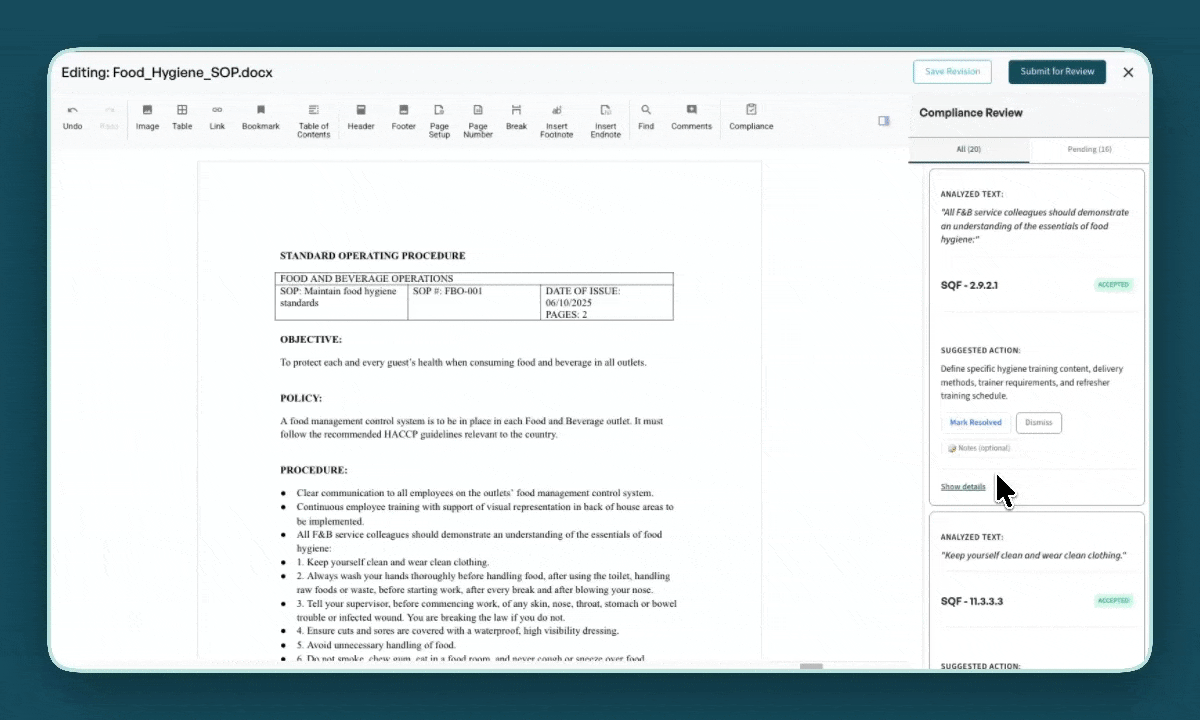
Traceability & Audit Trail: Yes - Complete HACCP traceability with lot code searchability across all critical control points. All HACCP records securely stored with timestamp and user tracking for audit readiness and regulatory compliance.
Pros:
- Quick 30-day HACCP implementation timeline
- Intuitive user-friendly interface requires minimal HACCP training
- AI-powered compliance reviews ensure HACCP plans meet FDA/FSMA standards
- Eliminates paper-based HACCP logs with fully digital workflows
- Strong supplier portal automates HACCP certification collection
- Excellent HACCP audit preparation with instantly searchable records
- Real-time monitoring with automated alerts when critical limits are breached
- Customizable dashboards provide visibility into CCP performance
Cons:
- Newer platform with smaller user community
- Limited information on integrations with legacy systems
- Advanced analytics features still developing
2. SafetyChain
SafetyChain is an enterprise-grade plant management platform focused on real-time data collection from the production floor. It offers comprehensive HACCP monitoring, quality control, and production performance tracking with strong IoT integration capabilities.
Best For: Mid-size to large food and beverage manufacturers with multiple facilities requiring real-time production monitoring
Pricing: Custom pricing (contact for quote)
Implementation Time: 3-6 months
Deployment Type/Access: Web, iOS, Android
Feature List:
For a comprehensive overview of the best FDA compliance software of 2026 and their key features, check out our detailed guide.
- Digital forms and HACCP monitoring
- Statistical Process Control (SPC)
- CAPA management
- Document control
- Supplier management
- Audit management
- Real-time analytics
Traceability & Audit Trail: Yes - Complete digital audit trail with real-time tracking and historical data access
Pros:
- Highly configurable platform adaptable to complex operations
- Strong real-time data visualization and SPC capabilities
- Excellent integration with production equipment and IoT devices
- Robust mobile functionality for plant floor operations
Cons:
- Higher learning curve due to extensive customization options
- Implementation can take several months for full deployment
- Interface can feel complex for smaller operations
3. FoodDocs
URL: https://www.fooddocs.com/
FoodDocs is a cloud-based food safety management system that uses AI to automatically generate HACCP plans and food safety documentation. It provides pre-built templates and smart monitoring tools designed for quick setup.
Best For: Small to mid-size food businesses, restaurants, and food service operations needing quick HACCP plan creation
Pricing: Starts at $169/month (tiered pricing based on features)
Implementation Time: 1-15 days
Deployment Type/Access: Web, iOS, Android
Feature List:
- AI-powered HACCP plan builder
- Digital monitoring and checklists
- Temperature logging
- Task management
- Training management
- Report generation
Traceability & Audit Trail: Yes - Digital records with timestamps and user tracking
Pros:
- Very fast implementation (can be ready in days)
- AI generates customized HACCP plans automatically
- Affordable pricing for small businesses
- User-friendly interface requires minimal training
Cons:
- Less suitable for complex manufacturing environments
- Limited customization compared to enterprise solutions
- Basic supplier management capabilities
- Not ideal for multi-facility operations
4. Safefood 360°
Safefood 360° is a comprehensive enterprise food safety and quality management system offering end-to-end compliance, supplier management, and audit preparation tools. Now part of Ideagen, it provides robust workflows for complex regulatory requirements.
Best For: Large food manufacturers and processors requiring comprehensive enterprise-wide food safety management
Pricing: Custom pricing (contact for quote)
Implementation Time: 4-8 months
Deployment Type/Access: Web, iOS, Android
Feature List:
- HACCP and food safety plan management
- Supplier and specification management
- CAPA tracking
- Audit management
- Document control
- Traceability and recall management
- Multi-site management
Traceability & Audit Trail: Yes - Enterprise-grade audit trails with full traceability across all modules
Pros:
- Comprehensive all-in-one solution covering all aspects of food safety
- Strong audit management and preparation features
- Excellent for managing multiple facilities and locations
- Deep expertise in GFSI scheme requirements
Cons:
- Significant implementation time and resources required
- Can be overwhelming for smaller operations
- Higher price point compared to mid-market solutions
- Steep learning curve for new users
5. FoodLogiQ
URL: https://www.foodlogiq.com/
FoodLogiQ (now part of Trustwell) provides advanced supply chain traceability and supplier compliance tracking, enabling complete visibility from source to shelf.
Best For: Food manufacturers and distributors requiring extensive supply chain traceability and supplier network management
Pricing: Custom pricing (contact for quote)
Implementation Time: 2-4 months
Deployment Type/Access: Web, iOS, Android
Feature List:
- Supply chain traceability
- Supplier compliance management
- Document verification
- Recall management
- Lot tracking
- Audit management
Traceability & Audit Trail: Yes - Industry-leading traceability with blockchain-enabled tracking and comprehensive audit trails
Pros:
- Excellent supply chain visibility and traceability capabilities
- Strong recall management and crisis response tools
- Large supplier network already on platform
- Strong focus on FSMA 204 compliance
Cons:
- Less focused on internal plant operations and HACCP monitoring
- Can be complex to configure supplier requirements
- Requires supplier participation for full effectiveness
- Limited production floor data collection features
6. SafetyCulture (iAuditor)
URL: https://safetyculture.com/
SafetyCulture offers iAuditor, a flexible inspection and audit platform used across many industries including food safety. It provides customizable checklists, mobile inspections, and issue management with broad applicability beyond HACCP.
Best For: Small to mid-size food businesses seeking flexible, affordable inspection and checklist management across multiple areas. Learn more about why Allera is a leader in food safety digitization.
Pricing: Free plan available; Paid plans start at $24/user/month
Implementation Time: 1-4 weeks
Deployment Type/Access: Web, iOS, Android
Feature List:
- Customizable digital checklists
- Mobile inspections
- Issue management
- Template library
- Automated reporting
- Training management
Traceability & Audit Trail: Yes - Digital records with timestamps, but not purpose-built for food safety compliance
Pros:
- Very affordable with free tier available
- Extremely user-friendly and intuitive interface
- Fast implementation and setup
- Large template library reduces configuration time
- Strong mobile app functionality
Cons:
- Not purpose-built for food manufacturing HACCP requirements
- Limited food safety-specific features and workflows
- No integrated supplier management
- Less robust for complex food safety programs
7. TraceGains
URL: https://www.tracegains.com/
TraceGains is a networked supplier compliance and product development platform that automates supplier document collection, specification management, and regulatory compliance tracking. It connects manufacturers with their supply chain partners.
Best For: Food manufacturers with extensive supplier networks requiring automated compliance document management and specification control
Pricing: Custom pricing (contact for quote)
Implementation Time: 2-5 months
Deployment Type/Access: Web, iOS, Android
Feature List:
- Supplier compliance automation
- Specification management
- Document verification
- Regulatory monitoring
- Label compliance
- Supplier onboarding
Traceability & Audit Trail: Yes - Comprehensive audit trails for all supplier documentation and specification changes
Pros:
- Excellent supplier onboarding and compliance automation
- Strong regulatory database with automatic alerts
- Large existing supplier network reduces setup friction
- Automated document collection saves significant time
Cons:
- Does not focus on internal HACCP monitoring or plant operations
- Higher cost for smaller supplier bases
- Implementation can be lengthy
- Requires supplier adoption for maximum value
What is HACCP Compliance Software?
HACCP compliance software is a digital platform designed to help food manufacturers implement, manage, and maintain their Hazard Analysis and Critical Control Points (HACCP) systems. As a type of food safety software, it automates compliance processes and streamlines food safety management. These solutions, similar to , support digital food safety by replacing manual, paper-based processes with automated workflows that monitor critical control points, document procedures, and ensure regulatory compliance throughout the production process. Many platforms also allow users to create and manage a digital HACCP plan, making it easier to update and verify compliance as needed. Once implemented, following HACCP principles becomes incredibly easy, as the software handles most of the work while you and your team complete daily food safety tasks, streamlining monitoring, recordkeeping, and reporting.
Why HACCP Compliance Software is Necessary
HACCP software isn’t just a convenience—it’s your foundation for FSMA and 21 CFR Part 11 compliance and meeting food safety standards, ensuring every record, action, and correction you make is audit-ready.
It provides the structure needed to maintain compliance, offering tools to manage and monitor critical food safety tasks so you can ensure ongoing adherence to regulations.
Effective HACCP software also supports employee training to maintain compliance and readiness.
Regulatory Requirements
Food manufacturers face increasingly complex regulatory landscapes. The FDA’s Food Safety Modernization Act (FSMA) mandates preventive controls and comprehensive documentation for most food facilities. Accurate record keeping is essential for regulatory audits and ongoing compliance. HACCP compliance software helps businesses meet these legal obligations by:
- Automatically documenting critical control point monitoring
- Maintaining tamper-proof electronic records
- Generating audit-ready reports instantly
- Tracking corrective actions and preventive measures
- Ensuring compliance with 21 CFR Part 11 for electronic records
- Helping businesses in the food industry stay current with evolving regulations
Using such software also supports the process of becoming HACCP certified by streamlining compliance and documentation requirements.
Risk Mitigation
When a food safety issue arises, every minute counts. Real-time alerts and CAPA tracking help you prevent problems before they escalate into costly recalls. HACCP software also streamlines hazard identification and incorporates a risk matrix, allowing teams to visualize, prioritize, and address potential hazards based on their severity and likelihood.
A single food safety incident can devastate a brand’s reputation and result in costly recalls. HACCP software significantly reduces risk by:
- Providing real-time alerts when critical limits are exceeded
- Ensuring consistent monitoring across all shifts and locations
- Eliminating human error in manual documentation
- Creating clear accountability with timestamped records
- Enabling rapid response to potential hazards
Operational Efficiency
Paper-based HACCP systems are time-consuming, prone to errors, and difficult to analyze. Digital solutions improve efficiency by:
- Reducing paperwork and administrative burden by up to 70% (Eden Green Customer Story)
- Eliminating lost or illegible records
- Enabling instant access to historical data
- Automating routine tasks and notifications
- Streamlining the visualization and management of process flow, including easy creation of process flow diagrams for better hazard control
- Improving efficiency and safety by automating the monitoring of food temperatures
- Streamlining audit preparation from weeks to days
Data-Driven Decision Making
Manual systems make it difficult to identify trends and improvement opportunities. HACCP compliance software enables:
- Real-time dashboards showing compliance status
- Trend analysis to identify recurring issues
- Predictive insights to prevent problems before they occur
- Performance metrics across multiple facilities
- Continuous improvement through data analytics
Key Benefits of Implementing HACCP Compliance Software
Improved Audit Performance
Digital HACCP systems make audits significantly easier. Auditors can quickly access organized, searchable records without sifting through binders. Many platforms offer secure auditor portals, allowing third-party inspectors to review documentation remotely, reducing on-site audit time and improving audit outcomes.
Enhanced Traceability
In the event of a food safety issue, rapid traceability is critical. HACCP software provides instant access to lot tracking, supplier information, and production records, enabling companies to track food products throughout the food supply chain. This allows businesses to quickly identify affected products and implement targeted recalls when necessary, helping ensure the safety of food products at every stage.
Supplier Management
Modern HACCP platforms extend beyond internal operations to manage supplier compliance. Automated supplier portals collect certificates of analysis, specification sheets, and compliance documentation, reducing the back-and-forth communication that often delays production.
Scalability
As food businesses grow, paper-based systems become unmanageable. HACCP compliance software scales seamlessly across multiple facilities, maintaining consistency while accommodating location-specific requirements.
Training and Accountability
Digital platforms track employee training completion, emphasizing its importance for HACCP compliance by ensuring staff understand procedures and critical control points, and create clear accountability for food safety tasks. Automated reminders ensure nothing falls through the cracks.
Who Needs HACCP Compliance Software?
HACCP compliance software benefits any organization involved in food production, processing, or distribution:
- Food Manufacturers: From small specialty producers to large-scale operations
- Meat and Poultry Processors: Managing USDA regulations and pathogen controls
- Beverage Producers: Ensuring quality and safety in bottling operations
- Co-Packers: Managing multiple client specifications and requirements
- Food Distributors: Maintaining cold chain integrity and traceability
- Restaurant Chains: Standardizing food safety across multiple locations
- Retail Food Operations: Managing fresh food preparation and display
Essential Features to Look For
When evaluating HACCP compliance software, focus on tools that simplify compliance, ensure accuracy, and empower every user — from plant floor workers to QA managers. A valuable feature to look for is a HACCP builder, which allows you to quickly create and customize HACCP plans to fit your facility’s specific needs.
Digital Forms and Checklists
Customizable, digital forms replace outdated paper logs used for monitoring critical control points, sanitation, receiving inspections, and quality checks.
Digital checklists ensure consistent monitoring and data integrity across every shift.
Look for systems that allow:
- Conditional logic (only show relevant fields based on prior answers)
- Offline data capture for remote or low-connectivity environments
- Automatic timestamps for accountability
Automated Alerts and Notifications
Real-time alerts notify teams when critical limits are exceeded or tasks are missed, allowing for immediate response.
Benefits:
- Prevent non-conformances before they escalate
- Improve response time across QA and production
- Ensure round-the-clock compliance visibility
Corrective Action Management (CAPA)
Workflows for documenting, assigning, and tracking corrective and preventive actions through completion.
A strong CAPA module should:
- Automatically trigger workflows from non-conformances
- Assign tasks to responsible users with due dates
- Track root causes, verification, and closure
Document Control
Centralized, version-controlled storage keeps SOPs, HACCP plans, and regulatory files organized and accessible.
Key capabilities:
- Approval workflows for new or revised documents
- Controlled access to prevent unauthorized edits
- Historical tracking of every version and approver
Supplier Compliance Management
Supplier portals simplify the collection and verification of certifications, COAs, and audit results.
Why it matters:
- Reduces time chasing documents
- Improves supplier visibility and accountability
- Ensures continuous compliance with regulatory partners
Mobile Access
Mobile-enabled systems let employees log data directly where work happens.
When compliance tools work from any device, data becomes part of the daily routine, not a burden
Examples:
- Record sanitation logs on a tablet
- Upload photos for verification
- Conduct inspections offline and sync automatically
Reporting and Analytics
Turn data into insight with custom dashboards and reports for management and regulatory bodies.
Use reports to:
- Track CAPA effectiveness over time
- Identify recurring non-conformances
- Monitor supplier performance trends
Integration Capabilities
Modern HACCP systems connect seamlessly with your ERP, QMS, or production software.
Integrations allow you to:
- Automate data transfer between systems
- Minimize manual entry errors
- Maintain consistent records across departments
Audit Trail
Maintain a tamper-proof digital record of all activity, changes, and approvals.
A robust audit trail provides:
- Instant traceability of every action
- Simplified regulatory and customer audits
- Enhanced accountability across teams
Multi-Site Support
For larger organizations, multi-site functionality ensures standardization while allowing local flexibility.
Capabilities include:
- Centralized oversight for corporate QA teams
- Site-specific permissions, workflows, and reporting
- Consistent processes across all facilities
Common Challenges HACCP Software Solves
Lost or Incomplete Records
Paper logs get misplaced, damaged, or left incomplete. Digital systems ensure every record is captured, timestamped, and stored securely.
Illegible Handwriting
Auditors and managers struggle to read handwritten logs. Digital entry eliminates this issue entirely.
Missed Monitoring Activities
Automated reminders and task assignments ensure critical monitoring never gets skipped during busy shifts.
Slow Audit Preparation
Gathering months of paper records for audits takes weeks. Digital systems provide instant access to organized documentation.
Difficulty Identifying Trends
Analyzing paper records for patterns is nearly impossible. Software provides visual dashboards showing trends over time.
Inconsistent Execution Across Shifts
Different employees may interpret procedures differently. Digital workflows enforce standardization regardless of who's on shift.
Delayed Corrective Actions
Issues documented on paper may not reach management for days. Software alerts stakeholders immediately, enabling rapid response.
Best Practices for HACCP Compliance
Implementing a robust HACCP (Hazard Analysis and Critical Control Points) system is essential for food businesses aiming to uphold the highest standards of food safety and meet all regulatory requirements. To ensure ongoing HACCP compliance and minimize food safety risks, consider these best practices:
- Conduct Thorough Hazard Analysis: Regularly review your processes to identify potential food safety hazards, including biological, chemical, and physical hazards. A comprehensive hazard analysis forms the foundation of an effective HACCP plan and helps prioritize preventive controls.
- Define and Monitor Critical Control Points (CCPs): Clearly establish critical control points within your production process where food safety hazards can be prevented, eliminated, or reduced to acceptable levels. Use digital tools to monitor critical control points consistently and ensure that all critical limits are strictly maintained.
- Maintain Accurate and Up-to-Date Documentation: Keep detailed records of all food safety procedures, monitoring activities, and corrective actions. Accurate documentation not only supports regulatory compliance but also streamlines food safety inspections and audit readiness.
- Train and Empower Employees: Regularly train your team on HACCP principles, food safety protocols, and the importance of monitoring procedures. Well-trained employees are more likely to follow food safety practices and respond effectively to any food safety issue.
- Verify and Validate Your HACCP System: Schedule routine verification procedures to confirm that your HACCP plan is working as intended. This includes reviewing monitoring records, conducting internal audits, and validating that control measures effectively manage food safety hazards.
- Foster a Culture of Continuous Improvement: Encourage feedback from your HACCP team and frontline staff to identify areas for improvement. Regularly update your HACCP plan to reflect changes in processes, new regulatory requirements, or lessons learned from food safety incidents.
By following these best practices, food businesses can strengthen their food safety management system, ensure ongoing HACCP compliance, and confidently meet both customer expectations and regulatory standards.
Next Steps for Choosing HACCP Compliance Software
Selecting the right HACCP software depends on your specific business needs:
Consider Your Operation Size: Small businesses may thrive with affordable, quick-to-implement solutions like FoodDocs or SafetyCulture, while large enterprises benefit from comprehensive platforms like SafetyChain or Safefood 360°.
Evaluate Your Primary Needs: If internal plant monitoring is your priority, choose platforms strong in HACCP monitoring and production data collection. If supplier management is critical, consider FoodLogiQ or TraceGains.
Assess Technical Resources: Solutions like Allera offer rapid 30-day implementation with minimal IT involvement, while enterprise platforms may require dedicated implementation teams and several months to deploy.
Plan for Growth: Choose software that can scale with your business, supporting multiple facilities and increasing complexity as you grow.
Prioritize User Adoption: The best software is the one your team will actually use. Prioritize intuitive interfaces and strong mobile capabilities for plant floor workers.
Comparison Takeaways
For rapid digital transformation and comprehensive internal HACCP management: Allera Technologies
For enterprise operations with multiple facilities and real-time production monitoring: SafetyChain or Safefood 360°
For supply chain traceability and supplier network management: FoodLogiQ or TraceGains
For flexible, affordable inspection management: SafetyCulture
Implementing HACCP compliance software is no longer optional for food manufacturers serious about food safety, regulatory compliance, and operational efficiency. The right platform transforms food safety from a paper-intensive burden into a strategic advantage, protecting your brand while improving your bottom line.
FAQs
What are the three main types of HACCP?
The three main types of HACCP systems are: (1) Regulatory HACCP, required by law for industries like seafood, juice, meat, and poultry; (2) Voluntary HACCP, implemented by companies to strengthen food safety and meet customer expectations; and (3) Certification HACCP, used to comply with third-party schemes like BRCGS, SQF, or ISO 22000.
What is the first step in a HACCP plan?
The first step in a HACCP plan is assembling the HACCP team. This group should include individuals from different areas of the facility—such as production, quality assurance, engineering, and management—so they can provide expertise and ensure all hazards are considered.
What is the correct order of HACCP system implementation?
The correct order of HACCP system implementation is: (1) Complete the 5 preliminary steps, (2) Apply the 7 HACCP principles in sequence, and (3) Integrate the plan with prerequisite programs like sanitation, training, and supplier controls. This order ensures hazards are systematically identified and controlled.
What is HACCP in food safety?
HACCP (Hazard Analysis and Critical Control Points) is a systematic approach to food safety that identifies, evaluates, and controls hazards in food production. Instead of relying on end-product testing, HACCP focuses on preventive measures at critical stages of the process to protect consumers from biological, chemical, and physical hazards.
What are the 5 preliminary HACCP steps?
The 5 preliminary steps are: (1) Assemble the HACCP team, (2) Describe the product, (3) Identify the intended use and consumers, (4) Construct a process flow diagram, and (5) Verify the flow diagram. These steps prepare the foundation before applying the 7 HACCP principles.
.avif)





.avif)


.avif)
.avif)
